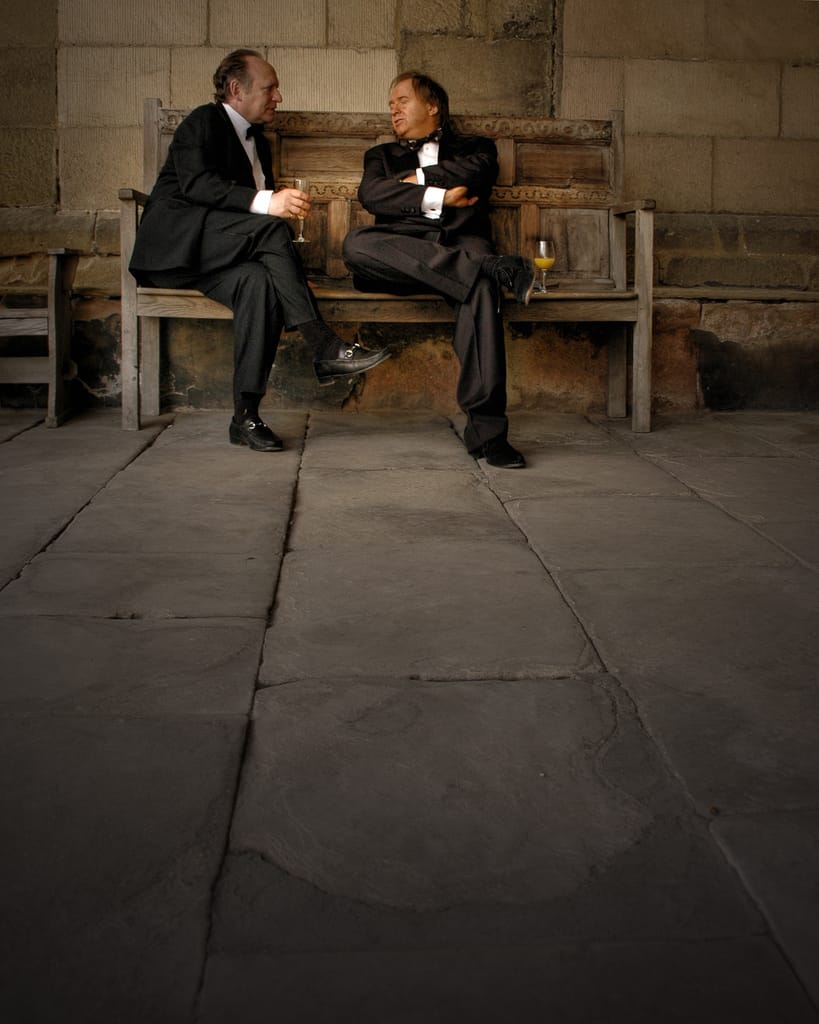Perhaps I live a sheltered life, but only recently did I meet for the first time a holocaust denier. At a wedding reception I sat next to an octogenarian relative of the groom. He was charming in the best sense of the word, gentlemanly in the gentlest of ways. His wispy, energetic frame and a head full of blond-gray hair belied his eighty-five years. Someone had told him that I used to teach English literature, so we eventually talked about the books we were reading. He: Chesterton and Bernanos. Me: Holocaust: The Nazi Persecution and Murder of the Jews by Peter Longerich. Only in retrospect do I see my mistake. Only certain occasions lend themselves to the topic of the Holocaust—baby showers, first dates, job interviews, and, yes, wedding receptions are off limits. Well, now I know.
But on that joyous evening I soldiered forth ignorantly. But it’s not like I went on and on about it. I only said, “I’m reading a great history of the Holocaust. It’s very thorough and well researched.” Mr. Fenstermacher set down his champagne flute next to a slice of fluffy wedding cake, uncrossed his legs and leaned in closer. “The Jews tend to blow it all out of proportion,” he said. I took a gulp from my own glass, and said, “Don’t the bride and groom look happy?” The deejay started up the Bee Gees, and I slid over to the dance floor.
Over the next few days I returned to this conversation several times, as if I was suffering from some sort of cognitive whiplash. For several weeks, usually in the evenings just before going to sleep I had been reading things like this:
After Himmler had agreed to a suggestion from the French Prime Minister, Pierre Laval, in early July that children under the age of 16 should also be included in the deportations, between 17 and 26 August over 2,000 children whose parents had already been taken to Auschwitz in the previous transports were also deported with the following five transports.
And this:
Jews who were ‘fit for work’ were sent to the camp, while those deemed ‘unfit for work,’ meaning in particular all children, their mothers, and elderly people were murdered in the gas chambers immediately after their arrival.
So to meet a pleasant gentleman who, over cake and champagne, actually denied the severity of the Holocaust shocked and confused me. I wondered how this could happen. What had happened in America to allow for the holding of such an extreme view? He delivered his opinion with no anger or passion. If I had asked him which brand of car tires he preferred, he would have delivered that opinion with a similar nonchalance. He was completely innocent and unaware of the severity and brutality of his opinion. One may hold lots of “opinions,” but attempts to downplay or soften the blow of the unprecedented, systematic murder of six million strikes me as a bit off the mark. He’s eighty-five, so there’s probably little chance that he’s going to change his “opinion,” so how do we prevent the spread of this egregious mistake and others like it?
To use the Holocaust or Hitler as an example, I know I launch the rhetorical equivalent of all my warheads. So the remainder of this essay will be about facts and opinions, and the role of education in negotiating between the two. It’s certainly a shame that such a nice, pleasant man holds such a tenuous grasp on the facts of the Holocaust, but it’s an even greater shame that somewhere along the line he’s been taught to think that the relationship between facts and opinions is so malleable, so isolating, and so selfishly private. Again, the Holocaust example is extreme, so if we want other examples of where facts and opinions based on those facts are so creatively related we can turn to this year’s Republican primary debate cycle. I pick on the Republicans because they are the only ones with a contested primary. I’m sure the Democrats would equally play loose and free with the facts were they to have dozens of debates. But can anyone honestly say that as a result of the 20 some-odd Republican debates that more light has been shed on either the problems of this country or their solutions?
I can only guess as to why Mr. Fenstermacher, my fellow wedding guest, holds his opinion. No matter the reason, I must assume that he has a vested interest in standing by it. Perhaps he gains something for himself, or maybe he takes something away from someone else. Nonetheless, it was sad to see such an otherwise kind and likeable fellow spew forth with such a provincial opinion. Held hostage by his own metanarrative, he was trapped in a state of pusillanimity. Let’s say, just for the sake of argument, that it was actually possible for one to “make too much” of the murder of six million people. What then would happen if we erred on the side of compassion and let “the Jews” express their disgruntlement? What’s at stake? What would “we” lose? What would “they” gain? Moreover, what happens to our souls when we soften the blow of genocide for the sake of our principles and our opinions? This is the troublesome dynamic that I address: when opinion grows wings of its own and flies in the face of the facts.
***
Once upon a time an education in the liberal arts and humanities was supposed to save us from the darker angels of our selves. Perhaps it was a pipe dream all along, but education was supposed to liberate us from our local, little opinions by putting us in touch with the rest of the world. At the very least formal education was seen in terms of national citizenship—a way to fuse together a unum from a pluribus. Now the trend seems to be more localization and a return of control to the local school board. This is a retrenchment and a shrinking away from the rest of humanity. And perhaps it’s a response born out of fears of an increasingly globalized world.
Where education and nationalism have failed, some argued that the market would come to our salvation and make a peaceable kingdom of consumption. As consumers we would come into contact with our brother and sisters spread over the globe and treat them with the respect and dignity that’s owed to our fellow shoppers, our suppliers, our labor force, etc. In other words, we will never go to war with China because they make our iPhones. More cynically, we can’t completely close our southern border or we would have to face the problem of who would tjen tend our children, and feed our lawns. The network of markets would bind us together so closely that we would be forced to love one another.
Then came the Great Recession. The cohesive bond of shopping dissolved before our very eyes, and something sinister threatens to take its place. As Nicholas Boyle puts it:
But consumerism loses its appeal in times of recession and when the funds run out and redundancy threatens even the deconstructionists notice that they are producers also, and even the myopians are forced to take the larger view. At this point the risk of fascism is at its most acute: the global perspective has been so long neglected that the nation whose identity quietly passed away during the last orgy of consumption may make some antiquated gestures of pointless self-assertion.
When civilizing systems—even half-baked ones based on “free market” theory—fail, fascism stands ready to fill the void. The wedding guest’s blindness to the severity of fascist crimes does not surprise. When we divorce opinion from fact for the sake of power and control we are not that far away from a fascism of our own sort.
Accounts of the dismal condition of our education system should alarm us. Drop-out rates rise as math, science, and literacy scores fall. We lag behind most of the developed world in all key education indices. Popular solutions suggest that we standardize learning and then teach children how to take the tests. Education has become not a search for the truth in all its variegated forms, but exercises in learning best practices, memorizing lists, and telling children “the answer.” An honest search for the truth scares the daylights out of the average student.
Recently in the New York Times, an Op-Ed piece called “The Go-Nowhere Generation” highlighted the reluctance of young Americans to move away from their hometowns to seek employment. Rather than move to a locale where job prospects are better, young adults will just as soon stay at home and remain unemployed because, according to the authors, they are “risk averse.” Anecdotally I can corroborate this thesis. When I taught high school seniors, I occasionally asked them what they were interested in doing for a career. The vast majority said “business.” “Oh, good,” I answered. “What sort of business are you interested in?” That question drew blank stares. They weren’t really interested in any particular field, but knew that “business” meant money, money meant security, and security meant happiness. A few admitted to this, saying they worried about maintaining the standard of living they enjoyed as children. A few expressed an interest in music, teaching, writing, the priesthood, the military, and public service, but they knew these were only exit doors out of the upper middle class. They were scared, sometimes panicked, and I’m not being hyperbolic. They had little interest in an exploration of truth’s many facets, instead they wanted classes on “business,” and they relished a math class where they could find the answers in the back of the book.
I’m not belittling their hard work or their commitment; after all, we’re the ones who taught them that the search for truth is a frightening and risky misadventure. The path away from our local, little fascisms begins with a liberating education that teaches them not only to maintain the tight connection between opinion and fact, but to not fear the search for truth. After all, the man called truth tells us over and over again, “Be not afraid.”





